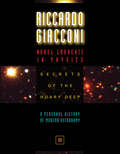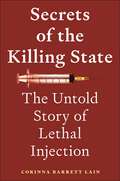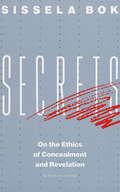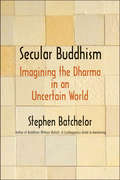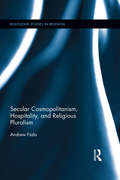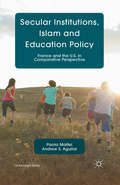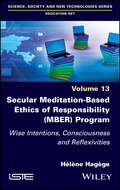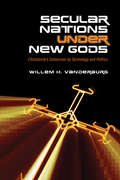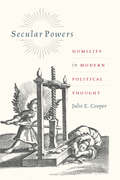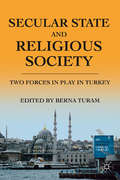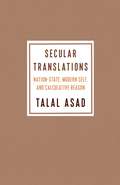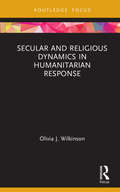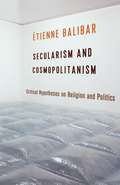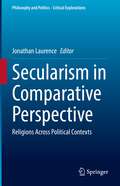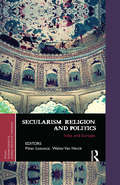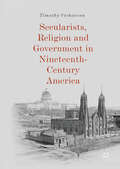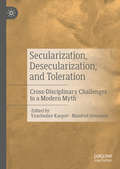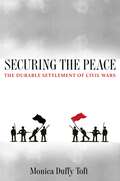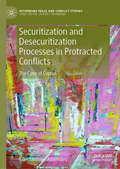- Table View
- List View
Secrets of the Hoary Deep: A Personal History of Modern Astronomy
by Riccardo GiacconiThe discovery of x-rays continues to have a profound and accelerating effect on the field of astronomy. It has opened the cosmos to exploration in ways previously unimaginable and fundamentally altered the methods for pursuing information about our solar system and beyond. Nobel Prize winner Riccardo Giacconi’s highly personal account of the birth and evolution of x-ray astronomy reveals the science, people, and institutional settings behind this incalculably important and deeply influential discipline.Part history, part memoir, and part cutting-edge science, Secrets of the Hoary Deep is the tale of x-ray astronomy from its infancy through what can only be called its early adulthood. It also offers the companion story of how the tools, techniques, and practices designed to support and develop x-ray astronomy were transferred to optical, infrared, and radio astronomy, drastically altering the face of modern space exploration. Giacconi relates the basic techniques developed at American Science and Engineering and explains how, where, and by whom the science was advanced. From the first Earth-orbiting x-ray satellite, Uhuru, to the opening of the Space Telescope Science Institute and the lift-off of the Hubble Space Telescope to the construction of the Very Large Telescope, Giaconni recounts the ways in which the management methods and scientific methodology behind successful astronomy projects came to set the standards of operations for all subsequent space- and Earth-based observatories. Along the way he spares no criticism and holds back no praise, detailing individual as well as institutional failures and successes, reflecting upon how far astronomy has come and how far it has yet to go.Crisp, informative, and prognostic, Giacconi’s story will captivate, inspire, and, at times, possibly infuriate professional and amateur astronomers across the breadth of the field and at all stages of their personal and professional development.
Secrets of the Japanese Art of Warfare
by Thomas Cleary[Secrets of the Japanese Art of Warfare is Thomas Cleary's translation of the seminal writings attributed to Yamamoto Kansuke (1501-1561) on Japanese martial arts and military service.] A mysterious man of humble origins, Yamamoto distinguished himself in the service of the redoubtable Takeda Shingen (1521-1573), heir to a long lineage of warriors and renowned for having fought thirty-nine battles without a single defeat. Yamamoto was a career soldier and founder of the so-called "School of Certain Victory," from which the famous Miyamoto Musashi (The Book of Five Rings) emerged. His school developed the art of discerning situational combat advantage, so that the attentive warrior or general would commit himself to action only when success was virtually assured. This approach demanded patience, mindfulness, and discipline, but in return yielded dividends on the battlefield and longevity for warriors. This strategy was studied and adopted by Shogun Tokugawa Ieyasu who used it to great effect, ultimately pacifying war-torn Japan under his single, unified banner in the early seventeenth century--a monumental achievement.[The science of warfare--particularly the study of enemy formations and movements in evolving combat situations--will be appreciated by all persons engaged in military, law enforcement, or emergency response, as well as by martial artists, athletes, business executives, diplomats and politicians, who will understand how to adapt them to their specific needs. Whoever the adversary may be, the insights to be found in this treatise hold the keys to certain victory!]
Secrets of the Japanese Art of Warfare
by Thomas Cleary[Secrets of the Japanese Art of Warfare is Thomas Cleary's translation of the seminal writings attributed to Yamamoto Kansuke (1501-1561) on Japanese martial arts and military service.] A mysterious man of humble origins, Yamamoto distinguished himself in the service of the redoubtable Takeda Shingen (1521-1573), heir to a long lineage of warriors and renowned for having fought thirty-nine battles without a single defeat. Yamamoto was a career soldier and founder of the so-called "School of Certain Victory," from which the famous Miyamoto Musashi (The Book of Five Rings) emerged. His school developed the art of discerning situational combat advantage, so that the attentive warrior or general would commit himself to action only when success was virtually assured. This approach demanded patience, mindfulness, and discipline, but in return yielded dividends on the battlefield and longevity for warriors. This strategy was studied and adopted by Shogun Tokugawa Ieyasu who used it to great effect, ultimately pacifying war-torn Japan under his single, unified banner in the early seventeenth century--a monumental achievement.[The science of warfare--particularly the study of enemy formations and movements in evolving combat situations--will be appreciated by all persons engaged in military, law enforcement, or emergency response, as well as by martial artists, athletes, business executives, diplomats and politicians, who will understand how to adapt them to their specific needs. Whoever the adversary may be, the insights to be found in this treatise hold the keys to certain victory!]
Secrets of the Killing State: The Untold Story of Lethal Injection
by Corinna Barrett LainLethal injection is nothing like what people think. This is its untold story.In the popular imagination, lethal injection is a slight pinch and a swift nodding off to forever-sleep. It is performed by well-qualified medical professionals. It is regulated and carefully conducted. And it usually provides a “humane” death. In reality, however, not one of those things is true.Secrets of the Killing State pulls back the curtain on this clandestine punishment practice, presenting a view of lethal injection that states have worked hard to hide. Botched executions are a part of this story, but they are just the tip of the iceberg. For all the suffering that we see, there is also suffering that we don’t see. Indeed, the story told here is even bigger than the executions themselves, for behind the scenes is where it unfolds. Fake science, torturous drugs, inept executioners, prison problems, and decades of state secrecy have created an execution method hard-wired to go wrong in countless ways.The story of lethal injection is a story of gross incompetence, law breaking, torturous deaths, and a stunning indifference to the way in which human beings die at the hands of the state. These are the secrets of the killing state—all that we know from litigation files, scientific studies, investigative journalism, autopsy reports, interviews, and scholarship across a number of fields. Death penalty expert Corinna Barrett Lain uses this groundbreaking journey into the dark reality of lethal injection to shine a light on the American death penalty more broadly and show that the state at its most powerful moment is also the state at its worst.We are now over 45 years into the lethal injection era, and most Americans still have no idea what states are doing in their name. It’s time they found out.
Secrets: On the Ethics of Concealment and Revelation
by Sissela BokThe author of Lying shows how the ethical issues raised by secrets and secrecy in our careers or private lives take us to the heart of the critical questions of private and public morality.
Secular Buddhism: Imagining the Dharma in an Uncertain World
by Stephen BatchelorAn essential collection of Stephen Batchelor's most probing and important work on secular Buddhism As the practice of mindfulness permeates mainstream Western culture, more and more people are engaging in a traditional form of Buddhist meditation. However, many of these people have little interest in the religious aspects of Buddhism, and the practice occurs within secular contexts such as hospitals, schools, and the workplace. Is it possible to recover from the Buddhist teachings a vision of human flourishing that is secular rather than religious without compromising the integrity of the tradition? Is there an ethical framework that can underpin and contextualize these practices in a rapidly changing world? In this collected volume of Stephen Batchelor's writings on these themes, he explores the complex implications of Buddhism's secularization. Ranging widely--from reincarnation, religious belief, and agnosticism to the role of the arts in Buddhist practice--he offers a detailed picture of contemporary Buddhism and its attempt to find a voice in the modern world.
Secular Cosmopolitanism, Hospitality, and Religious Pluralism (Routledge Studies in Religion)
by Andrew FialaThis book explores the idea of religious pluralism while defending the norms of secular cosmopolitanism, which include liberty, tolerance, civility, and hospitality. The secular cosmopolitan ideal requires us to be more tolerant and more hospitable toward religious believers and non-believers from diverse traditions in our religiously pluralistic world. Some have argued that the world’s religions can be united around a common core. This book argues that it is both impossible and inadvisable either to reduce religion to one thing or to deny religion. Instead, the book affirms non reductive pluralism and seeks to understand how we should live in a pluralistic world. Building on work in the sociology of religion and philosophy of religion, the book examines the grown of religious diversity (and the spread of nonreligion) in the contemporary world. It argues that religious toleration, hospitality, and compassion must be extended in a global direction. Secular cosmopolitanism recognizes that each person has a right to his or her deepest beliefs and that the diversity of the world’s religious and non-religious traditions cannot be reduced or eliminated.
Secular Institutions, Islam and Education Policy: France and the U.S. in Comparative Perspective (St Antony's Series)
by P. Mattei A. AguilarAmidst claims of threats to national identities in an era of increasing diversity, should we be worried about the upsurge in religious animosity in the United States, as well as Europe? This book explores how French society is divided along conflicts about religion, increasingly visible in public schools, and shows the effect that this has had.
Secular Meditation-Based Ethics of Responsibility (MBER) Program: Wise Intentions, Consciousness and Reflexivities
by Helene HagègeSecular Nations under New Gods: Christianity’s Subversion by Technology and Politics
by Willem H. VanderburgThe ongoing political muscle-flexing of diverse Christian communities in North America raises some deeply troubling questions regarding their roles among us. Earlier analyses including Herberg’s Protestant, Catholic, Jew showed that these three branches of the Judaeo-Christian tradition correspond to three forms of the American way of life; while Kruse’s One Nation Under God showed how Christian America was shaped by corporate America. Willem H. Vanderburg’s Secular Nations under New Gods proceeds based on a dialogue between Jacques Ellul’s interpretation of the task of Christians in the world and Ellul’s interpretation of the roles of technique and the nation-state in individual and collective human life. He then adds new insight into our being a symbolic species dealing with our finitude by living through the myths of our society and building new secular forms of moralities and religions. If everything is political and if everything is amenable to discipline-based scientific and technical approaches, we are perhaps treating these human creations the way earlier societies did their gods, as being omnipotent, without limits. Vanderburg argues that until organized Christianity becomes critically aware of sharing these commitments with their societies, it will remain entrapped in the service of false gods and thereby will continue to turn a message of freedom and love into one of morality and religion.
Secular Powers: Humility in Modern Political Thought
by Julie E. CooperSecularism is usually thought to contain the project of self-deification, in which humans attack God’s authority in order to take his place, freed from all constraints. Julie E. Cooper overturns this conception through an incisive analysis of the early modern justifications for secular politics. While she agrees that secularism is a means of empowerment, she argues that we have misunderstood the sources of secular empowerment and the kinds of strength to which it aspires. Contemporary understandings of secularism, Cooper contends, have been shaped by a limited understanding of it as a shift from vulnerability to power. But the works of the foundational thinkers of secularism tell a different story. Analyzing the writings of Hobbes, Spinoza, and Rousseau at the moment of secularity’s inception, she shows that all three understood that acknowledging one’s limitations was a condition of successful self-rule. And while all three invited humans to collectively build and sustain a political world, their invitations did not amount to self-deification. Cooper establishes that secular politics as originally conceived does not require a choice between power and vulnerability. Rather, it challenges us—today as then—to reconcile them both as essential components of our humanity.
Secular State and Religious Society: Two Forces in Play in Turkey
by Berna TuramOn the basis of original, empirically rich, and theoretically sound social research, the chapters in this volume reveal and analyze the complex relations between the secular government of Turkey and the religious persons and society within the Turkish state.
Secular Translations: Nation-State, Modern Self, and Calculative Reason (Ruth Benedict Book Series)
by Talal AsadIn Secular Translations, the anthropologist Talal Asad reflects on his lifelong engagement with secularism and its contradictions. He draws out the ambiguities in our concepts of the religious and the secular through a rich consideration of translatability and untranslatability, exploring the circuitous movements of ideas between histories and cultures.In search of meeting points between the language of Islam and the language of secular reason, Asad gives particular importance to the translations of religious ideas into nonreligious ones. He discusses the claim that liberal conceptions of equality represent earlier Christian ideas translated into secularism; explores the ways that the language and practice of religious ritual play an important but radically transformed role as they are translated into modern life; and considers the history of the idea of the self and its centrality to the project of the secular state. Secularism is not only an abstract principle that modern liberal democratic states espouse, he argues, but also a range of sensibilities. The shifting vocabularies associated with each of these sensibilities are fundamentally intertwined with different ways of life. In exploring these entanglements, Asad shows how translation opens the door for—or requires—the utter transformation of the translated. Drawing on a diverse set of thinkers ranging from al-Ghazālī to Walter Benjamin, Secular Translations points toward new possibilities for intercultural communication, seeking a language for our time beyond the language of the state.
Secular and Religious Dynamics in Humanitarian Response (Routledge Research in Religion and Development)
by Olivia J. WilkinsonThis book investigates the ways in which the humanitarian system is secular and understands religious beliefs and practices when responding to disasters. The book teases out the reasons why humanitarians are reluctant to engage with what are seen as "messy" cultural dynamics within the communities they work with, and how this can lead to strained or broken relationships with disaster-affected populations and irrelevant and inappropriate disaster assistance that imposes distant and relatively meaningless values. In order to interrogate secular boundaries within humanitarian response, the book draws particularly on qualitative primary data from the aftermath of Typhoon Haiyan in the Philippines. The case study shows how religious practices and beliefs strongly influenced people's disaster experience, yet humanitarian organisations often failed to recognise or engage with this. Whilst secularity in the humanitarian system does not completely exclude religious participation and expression, it does create biases and boundaries. Many humanitarians view their secularity as essential to their position of impartiality and cultural sensitivity in comparison to what were seen as the biased and unprofessional beliefs and practices of religions and religious actors, even though disaster-affected people felt that it was the secular humanitarians that were less impartial and culturally sensitive. This empirically driven examination of the role of secularity within humanitarianism will be of interest to the growing field of "pracademic" researchers across NGOs, government, consultancy, and think tanks, as well as researchers working directly within academic institutions.
Secularism and Cosmopolitanism: Critical Hypotheses on Religion and Politics (European Perspectives: A Series in Social Thought and Cultural Criticism)
by Étienne BalibarWhat is the relationship between cosmopolitanism and secularism—the worldwide and the worldly? While cosmopolitan politics may seem inherently secular, existing forms of secularism risk undermining the universality of cosmopolitanism because they privilege the European tradition over all others and transform particular historical norms into enunciations of truth, valid for all cultures and all epochs. In this book, the noted philosopher Étienne Balibar explores the tensions lurking at this troubled nexus in order to advance a truly democratic and emancipatory cosmopolitanism, which requires a secularization of secularism itself.Balibar argues for the idea of the universal against its particular dominant institutions. He questions the assumptions that underlie popular ideas of secularism and religion and outlines the importance of a new critique for the contemporary world. Balibar holds that conflicts between religious and secular discourses need to be reframed from a point of view that takes into account the cultural hybridization, migration and mobility, and transformation of borders that have reshaped the postcolonial age. Among the topics discussed are the uses and misuses of the category of religion and the religious, the paradoxical genealogy of monotheism, French laïcité’s identitarian turn, and the implications of the responses to the Charlie Hebdo attacks for an extended definition of free speech. Going beyond circumscribed notions of religion and the public sphere, Secularism and Cosmopolitanism is a profound rethinking of identity and difference that seeks to make room for a renewed political imagination.
Secularism and Freedom of Conscience
by Charles Taylor Jocelyn MaclureSecularism: the definition of this word is as practical and urgent as income inequalities or the paths to sustainable development. In this wide-ranging analysis, Jocelyn Maclure and Charles Taylor provide a clearly reasoned, articulate account of the two main principles of secularism—equal respect, and freedom of conscience—and its two operative modes—separation of Church (or mosque or temple) and State, and State neutrality vis-à-vis religions. But more crucially, they make the powerful argument that in our ever more religiously diverse, politically interconnected world, secularism, properly understood, may offer the only path to religious and philosophical freedom. Secularism and Freedom of Conscience grew out of a very real problem—Quebec’s need for guidelines to balance the equal respect due to all citizens with the right to religious freedom. But the authors go further, rethinking secularism in light of other critical issues of our time. The relationship between religious beliefs and deeply-held secular convictions, the scope of the free exercise of religion, and the place of religion in the public sphere are aspects of the larger challenge Maclure and Taylor address: how to manage moral and religious diversity in a free society. Secularism, they show, is essential to any liberal democracy in which citizens adhere to a plurality of conceptions of what gives meaning and direction to human life. The working model the authors construct in this nuanced account is capacious enough to accommodate difference and freedom of conscience, while holding out hope for a world in which diversity no longer divides us.
Secularism in Comparative Perspective: Religions Across Political Contexts (Philosophy and Politics - Critical Explorations #23)
by Jonathan LaurenceThis book confronts the key questions surrounding comparative secularism in historical perspective. The contributions critically consider the normative ideas and alternative political arrangements that govern religion’s relation to politics and to the public and private spheres. Containing contributions by world-renowned scholars such as Michael Walzer, Asma Afsaruddin and Sudipta Kaviraj, this book recounts the arguments, debates, and disputations regarding secular arguments for accommodating religion. It does so in both critical and appreciative ways and describes some of the outcomes in actually existing institutions, policies, and practical arrangements. With the addition of many non-Western experiences and viewpoints on how secularism is theorized and lived, politically and historically and from Europe and Asia to Africa and the Americas, this volume is of great value political philosophers across the globe.
Secularism, Identity, and Enchantment
by Akeel BilgramiBringing clarity to a subject clouded by polemic, Secularism, Identity, and Enchantment is a rigorous exploration of how secularism and identity emerged as concepts in different parts of the modern world. At a time when secularist and religious worldviews appear irreconcilable, Akeel Bilgrami strikes out on a path distinctly his own, criticizing secularist proponents and detractors, liberal universalists and multicultural relativists alike.<P><P> Those who ground secularism in arguments that aspire to universal reach, Bilgrami argues, fundamentally misunderstand the nature of politics. To those, by contrast, who regard secularism as a mere outgrowth of colonial domination, he offers the possibility of a more conceptually vernacular ground for political secularism. Focusing on the response to Salman Rushdie's Satanic Verses, Bilgrami asks why Islamic identity has so often been a mobilizing force against liberalism, and he answers the question with diagnostic sympathy, providing a philosophical framework within which the Islamic tradition might overcome the resentments prompted by its colonized past and present.<P> Turning to Gandhi's political and religious thought, Bilgrami ponders whether the increasing appeal of religion in many parts of the world reflects a growing disillusionment not with science but with an outlook of detachment around the rise of modern science and capitalism. He elaborates a notion of enchantment along metaphysical, ethical, and political lines with a view to finding in secular modernity a locus of meaning and value, while addressing squarely the anxiety that all such notions hark back nostalgically to a time that has past.
Secularism, Islam and Modernity
by M T Ansari Syed Alam KhundmiriSyed Alam Khundmiri (1922-83) was an important intellectual figure of his times, a true humanist with rare philosophical insights ranging over a wide field. The volume brings together Khundmiri's seminal essays which set out his dominant concerns: Marxism, with its indifference to questions of minorities in nationalism; existentialism, which he saw as being closed off to the problems of community; and Islam, which he examined in relation to history and notions of time and change. Overall, this absorbing collection of essays encapsulates Khundmiri's dual project of situating Islam in the modern context and scrutinizing the modern in the light of Islam. Particularly relevant in the present context of the increasing sacralization of politics, it will be read with great interest by students and scholars of philosophy, history, sociology, Islamic studies, Marxism, comparative religion, cultural studies, and political and social theory, as well as by the aware and concerned lay reader.
Secularism, Religion, and Politics: India and Europe (Ethics, Human Rights and Global Political Thought)
by Péter Losonczi Walter Van HerckThis book highlights the relationship between the state and religion in India and Europe. It problematizes the idea of secularism and questions received ideas about secularism. It also looks at how Europe and India can learn from each other about negotiating religious space and identity in this globalised post-9/11 world.
Secularists, Religion and Government in Nineteenth-Century America
by Timothy VerhoevenThis book shows how, through a series of fierce battles over Sabbath laws, legislative chaplains, Bible-reading in public schools and other flashpoints, nineteenth-century secularists mounted a powerful case for a separation of religion and government. Among their diverse ranks were religious skeptics, liberal Protestants, members of minority faiths, labor reformers and defenders of slavery. Drawing on popular petitions to Congress, a neglected historical source, the book explores how this secularist mobilization gathered energy at the grassroots level. The nineteenth century is usually seen as the golden age of an informal Protestant establishment. Timothy Verhoeven demonstrates that, far from being crushed by an evangelical juggernaut, secularists harnessed a range of cultural forces—the legacy of the Revolutionary founders, hostility to Catholicism, a belief in national exceptionalism and more—to argue that the United States was not a Christian nation, branding their opponents as fanatics who threatened both democratic liberties as well as true religion.
Secularization, Desecularization, and Toleration: Cross-Disciplinary Challenges to a Modern Myth
by Manfred Svensson Vyacheslav KarpovThis book challenges the modern myth that tolerance grows as societies become less religious. The myth inseparably links the progress of toleration to the secularization of modern society. This volume scrutinizes this grand narrative theoretically and empirically, and proposes alternative accounts of the varied relationships between diverse interpretations of religion and secularity and multiple secularizations, desecularizations, and forms of toleration. The authors show how both secular and religious orthodoxies inform toleration and persecution, and how secularizations and desecularizations engender repressive or pluralistic regimes. Ultimately, the book offers an agency-focused perspective which links the variation in toleration and persecution to the actors of secularization and desecularization and their cultural programs.
Securing the Peace: The Durable Settlement of Civil Wars
by Monica Duffy ToftTimely and pathbreaking, Securing the Peace is the first book to explore the complete spectrum of civil war terminations, including negotiated settlements, military victories by governments and rebels, and stalemates and ceasefires. Examining the outcomes of all civil war terminations since 1940, Monica Toft develops a general theory of postwar stability, showing how third-party guarantees may not be the best option. She demonstrates that thorough security-sector reform plays a critical role in establishing peace over the long term. Much of the thinking in this area has centered on third parties presiding over the maintenance of negotiated settlements, but the problem with this focus is that fewer than a quarter of recent civil wars have ended this way. Furthermore, these settlements have been precarious, often resulting in a recurrence of war. Toft finds that military victory, especially victory by rebels, lends itself to a more durable peace. She argues for the importance of the security sector--the police and military--and explains that victories are more stable when governments can maintain order. Toft presents statistical evaluations and in-depth case studies that include El Salvador, Sudan, and Uganda to reveal that where the security sector remains robust, stability and democracy are likely to follow. An original and thoughtful reassessment of civil war terminations, Securing the Peace will interest all those concerned about resolving our world's most pressing conflicts.
Securities Against Misrule
by Jon ElsterElster proposes a normative theory of collective decision making, inspired by Jeremy Bentham but not including his utilitarian philosophy. The central proposal is that in designing democratic institutions one should reduce as much as possible the impact of self-interest, passion, prejudice and bias on the decision makers, and then let the chips fall where they may. There is no independently defined good outcome that institutions can track, nor is there any way of reliably selecting good decision makers. In addition to a long initial chapter that surveys theories of collective decision making, notably social choice theory, and a chapter expounding and discussing Bentham's views, historical chapters on the jury, constituent assemblies and electoral systems develop and illustrate the main ideas. This work draws on a welter of case studies and historical episodes, from Thucydides and Plutarch to the present. It is also grounded in psychology, behavioral economics and law.
Securitization and Desecuritization Processes in Protracted Conflicts: The Case of Cyprus (Rethinking Peace and Conflict Studies)
by Constantinos AdamidesUsing the Cyprus conflict as a case study, this book examines how the securitization process in protracted conflict environments changes, as it becomes routinized and potentially even institutionalized. Furthermore, the process is not limited to the mainstream top-down path, as it also follows a horizontal and even bottom-up direction, which inevitably has an impact on the goals and securitization options of both the mainstream securitizing actors and the audience(s). Lastly, on a theoretical level it examines how the multi-directional securitization forces have an impact on the elite and audience-driven desecuritization efforts and ultimately on the prospects for conflict resolution. The book’s case study, the Cyprus question, offers an alternative reading of the forces dominating the specific conflict, while concurrently offers a useful framework for the study of similar protracted and deeply securitized conflicts.
